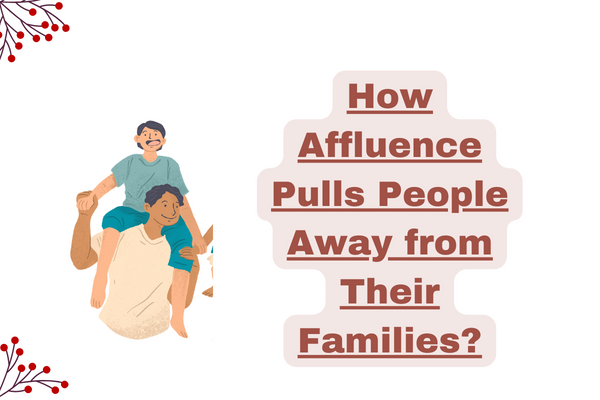So How Affluence Pulls People Away from Their Families?
In today’s fast-paced and materialistic world, the pursuit of affluence has become a significant goal for many individuals. However, this pursuit often comes at a cost, and one of the most significant casualties is the quality time spent with family.
This article explores how affluence can pull people away from their families, leading to strained relationships, emotional disconnection, and ultimately, a sense of emptiness.
Table of Contents
- The Allure of Affluence
- Time Constraints and Priorities
- The Influence of Technology
- Work-Life Imbalance
- Materialism and Consumerism
- Impact on Children
- Strained Marital Relationships
- Loss of Family Values
- Emotional Disconnect
- Loneliness and Isolation
- The Importance of Balancing Work and Family
- Prioritizing Quality Time
- Promoting Communication and Connection
- Cultivating Strong Family Bonds
- Conclusion
The Allure of Affluence
In our modern society, affluence is often equated with success, happiness, and social status. People strive to achieve financial prosperity and accumulate material possessions as symbols of achievement. However, the pursuit of affluence can overshadow the importance of family, leading individuals to prioritize work and material gain over spending time with their loved ones.
Time Constraints and Priorities
As people become more affluent, their schedules become increasingly demanding. Long working hours, business commitments, and social obligations leave little time for family interactions. Priorities shift towards professional success, leaving limited opportunities for shared experiences, bonding, and nurturing familial relationships.
The Influence of Technology
Technological advancements have revolutionized our lives, connecting us globally but often at the expense of meaningful connections within our families. The constant distractions of smartphones, social media, and digital entertainment can create a barrier between family members, reducing face-to-face communication and diminishing the quality of relationships.
Work-Life Imbalance
In the pursuit of affluence, individuals may find themselves trapped in a cycle of work-life imbalance. The pressure to succeed professionally can result in neglecting personal and family life, leading to feelings of guilt, resentment, and dissatisfaction. This imbalance can strain relationships, causing emotional distance between family members.
Materialism and Consumerism
Affluence can fuel a culture of materialism and consumerism, where possessions and wealth become the primary focus. The desire for material goods and a luxurious lifestyle can overshadow the importance of nurturing family connections. Consequently, individuals may spend excessive time working to afford their desired lifestyle, neglecting the emotional needs of their loved ones.
Impact on Children
Children growing up in affluent households may experience the negative consequences of affluence on family life. With parents consumed by their pursuit of success, children may receive less attention, guidance, and emotional support. They may also develop materialistic values and a sense of entitlement, hindering their ability to form deep and meaningful relationships later in life.
Strained Marital Relationships
Affluence can strain marital relationships, as partners become preoccupied with individual pursuits rather than nurturing their bond. The lack of quality time together can lead to emotional detachment, communication breakdowns, and a loss of intimacy. The erosion of marital satisfaction can create tension and discord within the family unit.
Loss of Family Values
The relentless pursuit of affluence can overshadow the importance of core family values. Traditions, customs, and shared beliefs that once held families together may be neglected or forgotten. As a result, the family unit loses its sense of identity and purpose, leading to a diminished sense of belonging and unity.
Emotional Disconnect
When affluence becomes the primary focus, emotional connections within the family can suffer. Members may feel isolated, unappreciated, or unheard, leading to a lack of emotional intimacy. Without open and honest communication, conflicts may arise, and relationships may deteriorate, further pulling individuals away from their families.
Loneliness and Isolation
Ironically, the pursuit of affluence can lead to a sense of loneliness and isolation. While surrounded by material wealth and social connections, individuals may feel emotionally detached and distant from their loved ones. The constant chase for more can create a void that material possessions cannot fill, leaving individuals feeling empty and disconnected.
The Importance of Balancing Work and Family
To counteract the detrimental effects of affluence on family life, it is essential to strike a balance between work and family commitments. Recognizing the significance of quality time and nurturing relationships can lead to a more fulfilling and harmonious family life.
Prioritizing Quality Time
Prioritizing quality time involves setting aside dedicated periods for family interactions and activities. This may include shared meals, family outings, or simply engaging in meaningful conversations. By consciously making time for one another, family members can strengthen their bonds and create lasting memories.
Promoting Communication and Connection
Effective communication is vital for maintaining strong family relationships. Actively listening, expressing emotions, and resolving conflicts in a respectful manner fosters understanding and connection. Regular family meetings or discussions can help address concerns and reinforce the importance of open dialogue.
Cultivating Strong Family Bonds
Building strong family bonds requires effort and commitment from all members. Engaging in shared hobbies, volunteering together, or participating in family rituals and traditions promotes a sense of unity and belonging. By creating a supportive and loving environment, families can navigate the challenges of affluence while remaining connected.
FAQs
- How does affluence impact family dynamics? Affluence can strain family dynamics by prioritizing work over quality time with loved ones, fostering materialism, and creating emotional distance.
- What are the consequences of neglecting family for affluence? Neglecting family for affluence can lead to strained relationships, emotional disconnect, loneliness, and a loss of family values.
- Can affluence affect children’s development? Yes, affluence can impact children’s development by reducing parental attention, fostering materialistic values, and hindering the formation of meaningful relationships.
- How can individuals balance work and family commitments? Individuals can balance work and family commitments by prioritizing quality time, promoting open communication, and cultivating strong family bonds.
- What are some ways to foster emotional connection within the family? Fostering emotional connection within the family involves active listening, expressing emotions, resolving conflicts, and engaging in shared activities and traditions.
Conclusion
While affluence may bring material wealth and social recognition, it can also pull people away from their families. The pursuit of success and material possessions can result in strained relationships, emotional disconnection, and a loss of core family values. However, by recognizing the importance of balancing work and family, prioritizing quality time, and fostering open communication, individuals can create a harmonious and fulfilling family life.
Visit the link to read more: https://family-fitness-fun.com/what-are-people-looking-for-in-online-fitness-classes/





